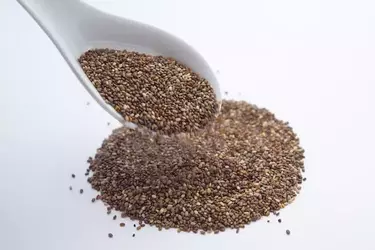Chia seeds are tiny black seeds that come from the plant Salvia hispanica, native to Mexico and Guatemala.
They are considered a superfood because they are rich in omega-3 fatty acids, protein, fiber, antioxidants, calcium, iron and other nutrients.
They have many health benefits, such as lowering blood pressure, cholesterol and inflammation, improving blood sugar control, promoting weight loss and supporting bone health.
However, some people may experience bloating when they consume chia seeds, particularly if they are not used to eating high-fiber foods.
Bloating is a common digestive issue that can cause discomfort and a feeling of fullness in the abdominal area.
In this blog post, we will explore why chia seeds can cause bloating and how to prevent it.
Why Can Chia Seeds Cause Bloating?

There are two main reasons why chia seeds can cause bloating: their high fiber content and their ability to absorb water.
High Fiber Content
Chia seeds are high in fiber, with about 10 grams of fiber per ounce (28 grams). This is a significant amount of fiber, and consuming large quantities of chia seeds or increasing your fiber intake too quickly can cause bloating and other digestive issues.
Fiber is a type of carbohydrate that cannot be digested by the human body. It passes through the digestive tract mostly intact and helps to regulate bowel movements, lower cholesterol levels, balance blood sugar levels and feed the beneficial bacteria in the gut.
However, too much fiber or a sudden change in fiber intake can also have some negative effects on digestion. Fiber can increase the volume and gas production in the intestines, which can lead to bloating, cramping, flatulence and diarrhea.
This is especially true for people who have irritable bowel syndrome (IBS), inflammatory bowel disease (IBD) or other digestive disorders.
Water Absorption
Another reason why chia seeds can cause bloating is their ability to absorb water.
Chia seeds can absorb up to 15-20 times their weight in water, which means they expand in size when they come into contact with liquids.
This is why chia seeds form a gel-like substance when soaked in water or added to smoothies, puddings or soups.
This property of chia seeds can be beneficial for hydration, satiety and blood sugar control, but it can also cause problems for some people.
When chia seeds expand in the stomach, they can create a feeling of fullness and pressure that can trigger bloating.
Moreover, when chia seeds move through the gut, they draw water from the intestinal area, working like a sponge. This can cause dehydration and constipation if not enough fluids are consumed along with chia seeds.
How to Prevent Bloating from Chia Seeds
Bloating from chia seeds is not a serious health issue and can be easily prevented by following some simple tips:
#1 Start small
If you are new to chia seeds or high-fiber foods in general, start with a small amount and gradually increase your intake over time.
This will give your digestive system time to adjust and avoid any adverse reactions.
A good starting point is one teaspoon of chia seeds per day.
#2 Soak them
Soaking chia seeds in water or other liquids for at least 10 minutes before eating them can help to reduce bloating.
This way, they will already be expanded before they enter your stomach and intestines.
You can also soak them overnight in the fridge for a ready-to-eat breakfast or snack.
#3 Drink plenty of water
Drinking enough water throughout the day is essential for hydration and digestion.
It will help to flush out any excess gas and waste from your system and prevent dehydration and constipation from chia seeds.
Aim for at least eight glasses of water per day, and drink more if you exercise or live in a hot climate.
#4 Avoid other gas-producing foods
Some foods are known to cause more gas and bloating than others. These include beans, lentils, cabbage, broccoli, cauliflower, onions, garlic, dairy products and artificial sweeteners.
If you are prone to bloating from chia seeds or other sources, you may want to limit or avoid these foods until your symptoms subside.
#5 Consult your doctor
If you have any medical conditions or allergies that may affect your digestion or reaction to chia seeds, you should consult your doctor before adding them to your diet.
This is especially important if you have IBS, IBD or other digestive disorders.
Summary
Chia seeds are a nutritious superfood that can offer many health benefits. However, they can also cause bloating for some people due to their high fiber content and water absorption capacity.
To prevent bloating from chia seeds, start with a small amount and soak them before eating them. Drink plenty of water throughout the day and avoid other gas-producing foods.
If you have any medical conditions or allergies that may affect your digestion or reaction to chia seeds, consult your doctor before adding them to your diet.
The Bottom Line
We hope this blog post has helped you understand why chia seeds can cause bloating and how to prevent it.
If you enjoyed this article, please share it with your friends and family who may benefit from it.
If you have ever experienced bloating from chia seeds, feel free to share your experience in the comments below.
Thank you for reading and have a nice day!




